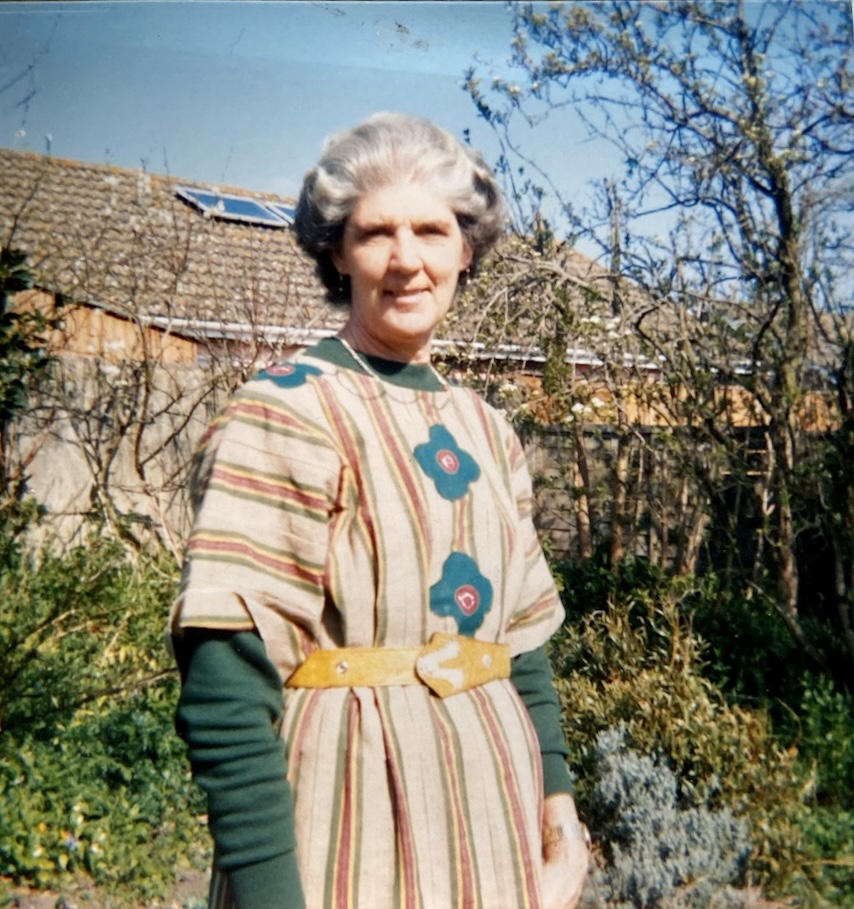Rosa Jane Pelly 1931 – 2019
Jane Pelly was a well respected and influential educator, chiefly in Nigeria, throughout the second half of the twentieth century. Jane was renowned for her love of bright clothing, and in her latter years could often be spotted in Salisbury marketplace, sporting colourful clothing including a hat.
Jane was already well travelled before she was 5 years old. She was born in Salisbury in early 1931, into the Wordsworth family dynasty on her mother Salome Pelly’s side. Shortly after her birth she travelled with her mother and older sister to India, to join her father, the Reverend Pelly, who was a headteacher there.
The family returned to England in 1934, and the remainder of Jane’s childhood was spent in London’s East End, Northumberland and Trowbridge, as her father’s work took him to those various parishes. Jane completed her education at St Mary’s Calne where she was Head Girl. She went on from there to study Zoology at Lady Margaret Hall, Oxford.
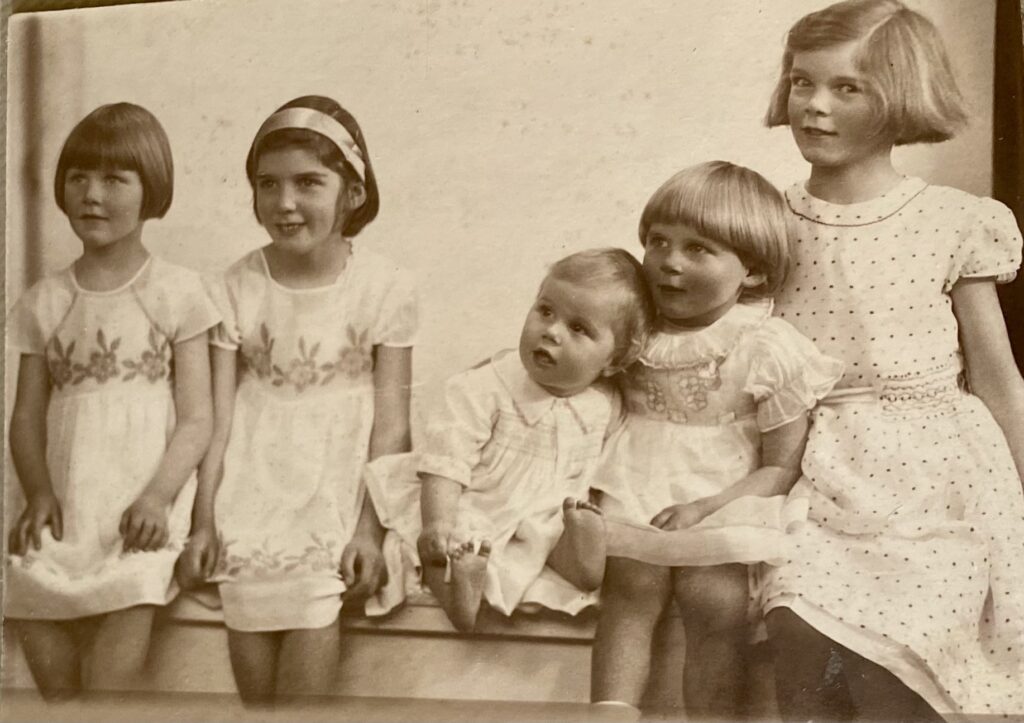
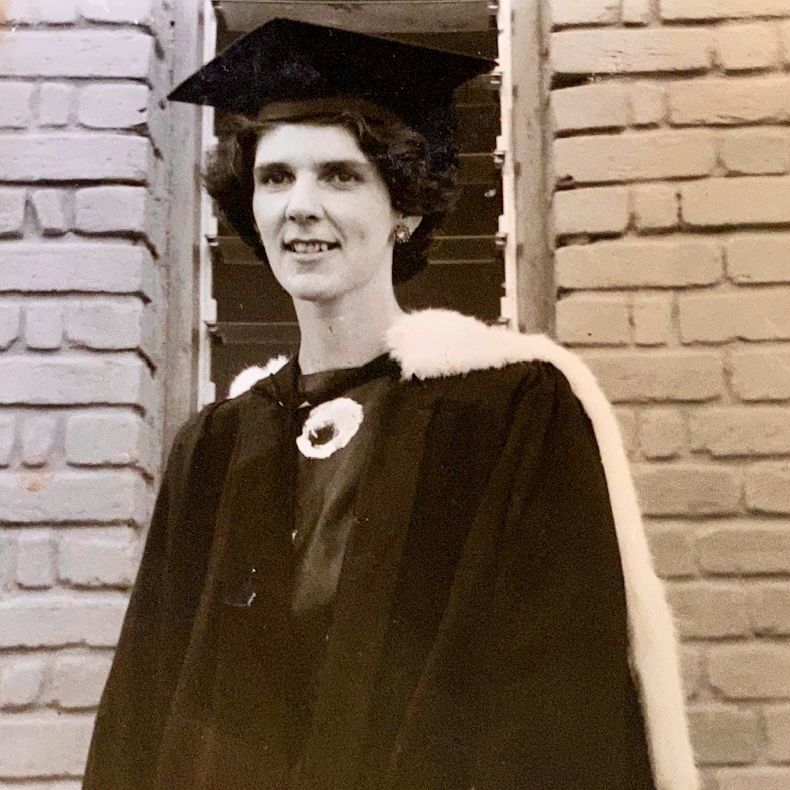
Throughout Jane’s childhood, her Aunt Faith was a significant influence. During the war Jane and her sister Elizabeth outgrew the village school and were sent to live with their aunt in Keswick so that they could attend the grammar school there. Faith was an educator based in Nigeria (although she returned to live in England in 1942), and gifted the Pelly household with Nigerian artefacts. It was no surprise to her family when Jane became interested in following her aunt’s inspiring lead, and travelled to Nigeria in 1956 to teach. After a successful three years, she applied for a new position – that of founder of Fiwasaye Girls’ Grammar School. It was a tough assignment, establishing a Christian educational setting in a relatively poor, primarily Muslim area. However, she took on the challenges fearlessly, and led the school’s design in terms of layout, timetable and ethos. The school had strong foundations in Christian belief, and high standards of behaviour. Hard work and responsibility were encouraged at the school, and in turn the pupils could enjoy a wealth of extra curricular activities such as sport, drama and music. The first cohort of pupils founded the Old Girls’ Association and now influence their communities, in turn.
After her death, decades later, this association sent representatives to her memorial service from across the world. They produced a beautiful “Book of Memories”, which included the following tribute:
“A caring and selfless mother, who cared for each of us as the need arose. A teacher par excellence, who gave us a holistic education. A role model, disciplinarian and mentor.
Although Fiwasaye was perhaps Jane Pelly’s greatest achievement, she also taught at the Federal Government Colleges in Kazaure and Benin City during the 1970s, and in 1972 was awarded an MBE for services to Nigerian education. She experienced hardship in the country too though. On one occasion during a period of civil war, her home was requisitioned by the Nigerian army,. She spoke to the officer in charge firmly, making him promise to leave her bungalow alone, although she spent a night with machine guns trained on it. When the army left, her cook and housekeeper emerged from their hiding places in her home – they belonged to the opposing side in the war, and would have been murdered if discovered.
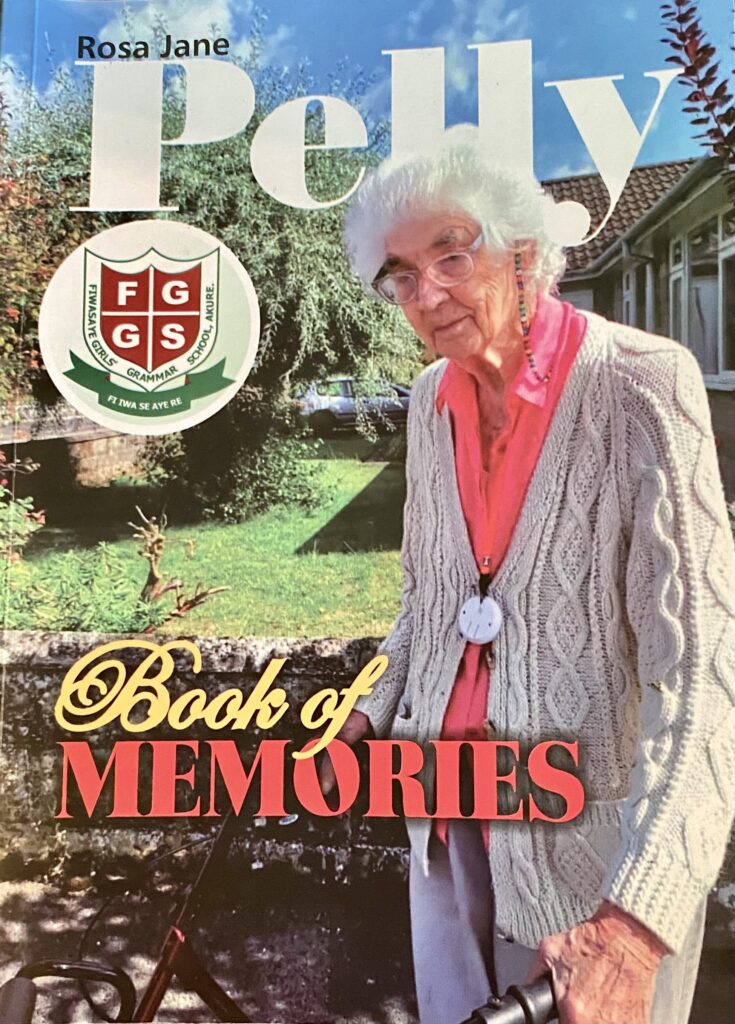
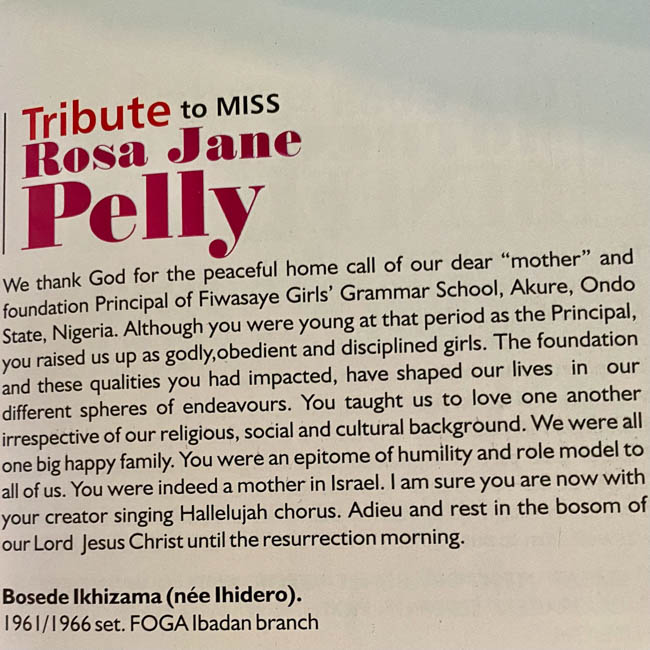
Although Fiwasaye was perhaps Jane Pelly’s greatest achievement, she also taught at the Federal Government Colleges in Kazaure and Benin City during the 1970s, and in 1972 was awarded an MBE for services to Nigerian education. She experienced hardship in the country too though. On one occasion during a period of civil war, her home was requisitioned by the Nigerian army,. She spoke to the officer in charge firmly, making him promise to leave her bungalow alone, although she spent a night with machine guns trained on it. When the army left, her cook and housekeeper emerged from their hiding places in her home – they belonged to the opposing side in the war, and would have been murdered if discovered.
Through family ties in the city, Jane maintained her links with Salisbury, spending her leave with her parents, and it was her natural destination when she eventually left Nigeria in 1979. She became a lay reader in Salisbury Diocese, and was a frequent speaker at school assemblies, took services at a local care home and became a Cathedral guide. She also continued to travel as a Christian Aid teacher, in Uganda and Sudan. Despite her dedicated work in countless charities she was reportedly often frustrated not to be able to do even more to help those in need. The Bishop of Salisbury at the time stated that she did not know the meaning of “retirement”.
“Jane is our conscience” was another description of her. Jane was uncompromising in her beliefs, and was bold in expressing her views, which sometimes brought her into conflict with people around her. The assertive leadership skills that had been vital to a leadership role in Nigeria, were more tricky to incorporate back into English society. After the difficulties of living in a war torn country, personal disagreements must have seemed on a completely different scale – a perspective that, thankfully, many of us have never had to face. However, her character also inspired warm affection from those who knew her well, in the Christian community in Salisbury, and in her great friend, Marie Terese Hosmalin, a former sculptor, who Jane enabled to take up her art again in the final years of her life.
Jane never had children of her own, but she was mother to a whole school full of girls.
“Miss R J Pelly good mother, sweet mother a mentor, a role model, thank God for a fulfulled life worthy of emulation.”
Research & article Rachel Cude
Her Salisbury Story would also like to thank Robina Hattersley (Jane’s sister) for helping with information and photographs
Sources
Bibliography
- Find my past birth records transcription Q1 1931 5A 220
- FINDMYPAST 1931 Passenger list leaving for Bombay
- Ancestry.co.uk 1934 Inbound Brisbane to UK – ship’s passenger list
- Find my past: 1939 register
- Find my past: 1956 passenger list UK to Nigeria
- Fiwasaye Girls’ School Nigeria – website Welcome to FGGS – Fiwasaye Girls’ Grammar School (fiwasayegirlsakure.com)
- Salisbury Journal death notice
- Book of Memories – a publication of Fiwasaye Old Girls’ Association, Lagos Branch
- Memorial Service tribute transcript
- Interview with sister Robina Hattersley, at her home, September 2021
.

